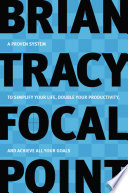Summary
The Power of Focus is a transformative guide that delves into the essential principles of maintaining concentration in a world filled with distractions. The authors, Jack Canfield, Mark Victor Hansen, and Les Hewitt, present a comprehensive framework that helps individuals identify their goals, manage their time effectively, and cultivate habits that foster productivity. The book is structured around seven key ideas that serve as pillars for achieving and maintaining focus.
The first idea, clarity of purpose, emphasizes the importance of knowing what truly matters to you. This clarity acts as a guiding force, helping you prioritize tasks and make decisions that align with your core values. The authors encourage readers to engage in self-reflection and articulate their vision to foster motivation and commitment.
Next, the book discusses time management, outlining various strategies to help individuals allocate their time wisely. By creating structured schedules and setting boundaries, readers can minimize procrastination and enhance productivity. The authors stress that time is a finite resource, and how it is spent significantly impacts goal achievement.
The third idea revolves around the power of habits. The authors explain how positive habits can automate productive behaviors, making it easier to maintain focus. Consistency and repetition are emphasized as key components in habit formation, and breaking negative habits is equally important to avoid distractions.
Mindfulness and presence are explored as essential elements of focus. The book highlights the benefits of being present in the moment, which can improve concentration and reduce anxiety. Mindfulness practices, such as meditation, are recommended to enhance one’s ability to engage fully with tasks.
The importance of environment is another critical concept discussed in the book. The authors advocate for creating a workspace that minimizes distractions and promotes concentration. A clutter-free environment, along with supportive social interactions, can significantly enhance focus.
Goal setting and review are highlighted as vital for maintaining focus. The SMART criteria for goal setting are emphasized, along with the importance of regular reviews to assess progress. Breaking larger goals into manageable tasks helps prevent overwhelm and fosters motivation.
Lastly, accountability and support systems are discussed as crucial for sustaining focus. The authors suggest that sharing goals with others who can provide encouragement and hold you accountable enhances commitment and motivation.
Overall, The Power of Focus serves as a practical guide for individuals seeking to enhance their productivity and achieve their goals. It combines actionable strategies with motivational insights, making it a valuable resource for anyone looking to improve their focus and effectiveness in both personal and professional realms.
















